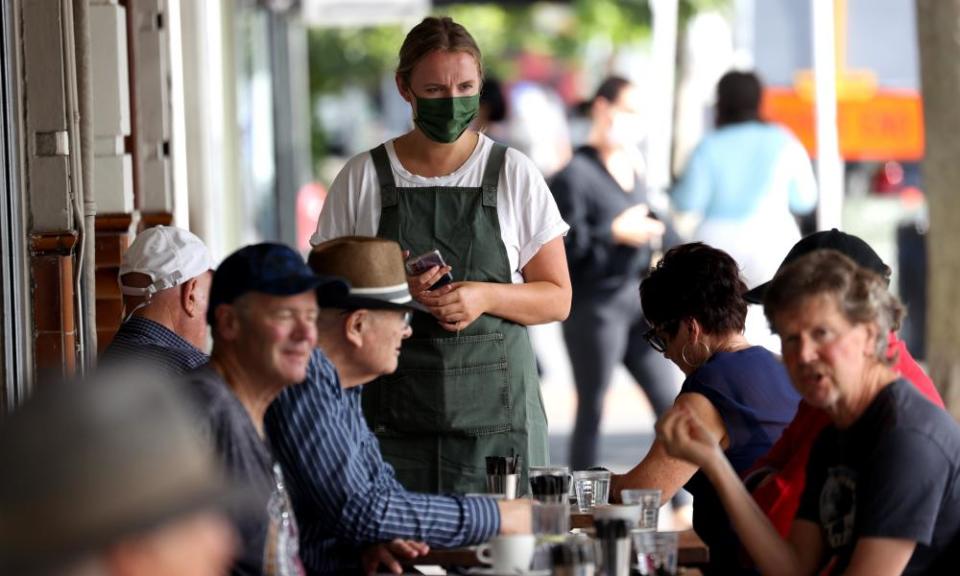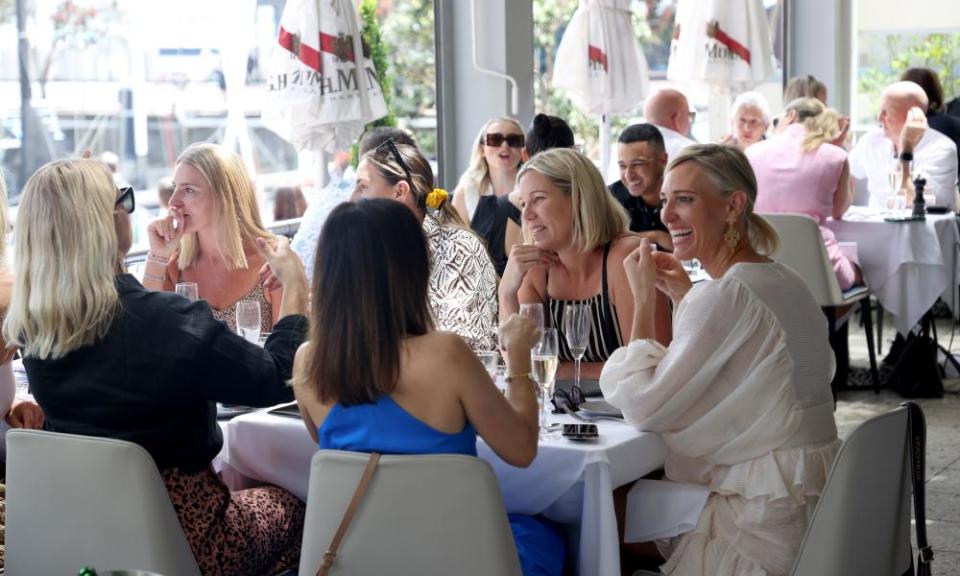‘Electric vibe’: Auckland celebrates end of lockdown with brunch and traffic gridlock

Vaccinated people in New Zealand’s largest city can now go to the pub for the first time in over 100 days
In Auckland, nature was healing. The ungroomed lined up for their eyebrow appointments. Bars flung open their doors with the promise of free drinks. Locals posted photos of their flat whites and brunch menus. The city’s sky tower was lit up for the first day of the “traffic light” reopening. And, in perhaps the truest sign that the gridlock-plagued city was on its pathway to normalcy, four lanes of the southern motorway were bumper to bumper.
The traffic light system, announced by prime minister Jacinda Ardern in late November, ends lockdowns in favour of restrictions on the unvaccinated. The red, orange and green levels depend on vaccination rates and the level of strain on the health system, but even at red – the strictest level – businesses are fully open to the vaccinated, with some restrictions on gathering size.
Related: ‘Bawled my eyes out’: tears and cheers of New Zealanders free to head home
Friday marked the first day of eased Covid restrictions in New Zealand’s largest city, after a gruelling 107 days in lockdown. For the vaccinated, much of life opened up at midnight on Thursday: they could once again invite family and friends into their homes, plan a trip to the gym, drink in a bar, sit in a cafe and drink an espresso. For the small percentage of the country who remain unvaccinated, the divide between them and fellow New Zealanders suddenly became tangible.
As Aucklanders emerged, blinking, into their new freedoms, some felt exhilarated. “There’s such a weird, strange, electric vibe in Auckland today,” said breakfast host Matty McLean on Twitter. “Like the first day back at school! We just went and sat down at our local cafe and it was such a simple, yet exciting activity!”

Mayor Phil Goff declared it “a day to celebrate and enjoy,” and some Aucklanders committed to just that. At Headquarters bar, a man told a Stuff reporter that being back at the pub was “insane g”. “I’m a plumber that just loves getting on the rinse,” he said. “Free drinks, how good.”
The opposition said the new freedoms didn’t go far enough, with National party leader Christopher Luxon calling the change “harsh news for bars and restaurants across Auckland who suffered 100 days of lockdown and who now will be unable to host large Christmas and New Years’ events”. Others expressed trepidation – including for workers tasked with checking vaccine passports, for Māori communities, whose vaccination rates remain behind the rest of the country, and about divisions caused by the increasingly divergent experiences of vaccinated and unvaccinated New Zealanders.
Deputy prime minister Grant Robertson said claims that New Zealand would become a “divided nation” could be countered by the high rates of vaccination: “Getting 90 percent-plus of New Zealanders to agree on anything is a highly unusual achievement.”
Related: As New Zealand lifts Covid lockdowns, some small towns ask tourists to stay away
The day marks a key milestone in the country’s transition from using lockdowns as a primary public health strategy to relying on vaccination instead. Experts have said that they cannot predict how the newly loosened restrictions will affect the virus’s spread – but there are some reasons for optimism. Average daily cases in Auckland have stabilised and seem to be starting to drop. On Friday, the country announced 92 new cases – the first time that daily case number has dropped below 100 since October. The director of public health, Dr Caroline McElnay, said the dropping cases were a promising sign that the country’s rising vaccination rates were eating into the virus’s ability to spread.
As of Thursday, the Ministry of Health reported that 93% of the eligible population (those aged 12 and over) had had at least a first dose of the vaccine, and 86% were fully dosed. Māori continue to sit behind the rest of the population, raising concerns that they will bear the brunt of a larger outbreak: 83% of Māori had had a first dose and 69% were fully vaccinated.

 Yahoo Finance
Yahoo Finance 